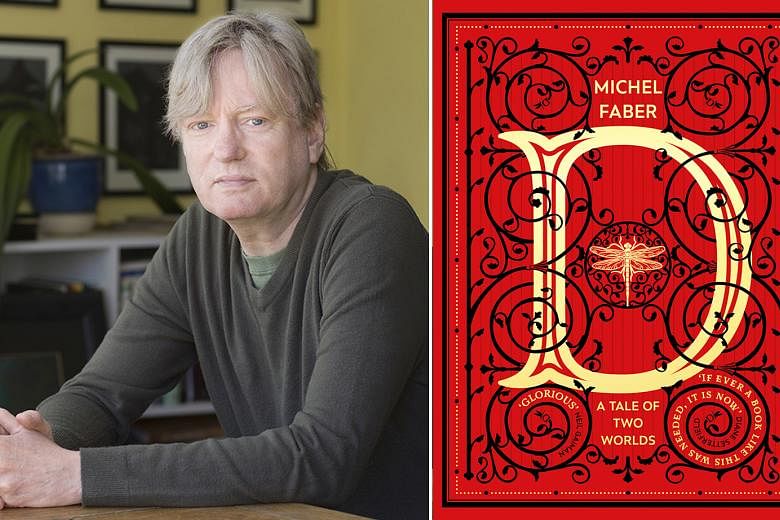FICTION
D: A TALE OF TWO WORLDS
By Michel Faber
Doubleday/296 pages/$34.52/Available at bit.ly/TaleTW_Faber
Rating: 3.5 Stars
Fans of author Michel Faber will know that his writing often defies categorisation into easy genres.
So D: A Tale Of Two Worlds takes the form of a young adult narrative that pilfers from genres ranging from Victorian melodrama to English fairy tales to modern-day fables.
Everything in that preceding sentence can be challenged. To call this a young-adult book is a misnomer, because the average young adult is likely to miss all the Charles Dickens references, from Magwitches - here, they are literally witchy crones - to Mr Pumblechook.
Faber says in a note that this book was finished in time for the 150th anniversary of Dickens' death, but this seems entirely coincidental, since he also says the book was begun 35 years ago.
Fans of Victorian melodrama are likely to look askance at the plotting. After a promising start - in which the young female protagonist Dhikilo Saxardiid Samawada Bentley escapes her war-torn homeland of Somaliland as a baby and is adopted by the very English couple of Ruth and Malcolm, who dwell in the town of Cawber - the story veers from melodrama to straight fantasy territory, as the letter "D" begins to go missing and Dhikilo goes on a quest to restore it.
Devotees of English fantasy stories will likely take to the middle sections where, after Dhikilo steps through a giant book - a la C.S. Lewis' The Lion, The Witch And The Wardrobe - she enters the land of Liminus and encounters a motley crew of races in Gulliver fashion.
But Liminus and its odd peoples remind one more of Roald Dahl's Loompaland and Frank Baum's Oz than the literary metaphors of Jonathan Swift.
By this time, readers would either have given up on the flat pacing or been charmed by the eccentric detours so characteristic of Faber.
This is no surprise, as the author has carved out a singular fictional path in his career. This is the guy who created the charmingly horrific first-person alien-hunter narrative of Under The Skin and upended Victorian gender constructs spectacularly in The Crimson Petal And The White, while telling a seemingly conventional Victorian tale about a businessman undone by his women. One does not pick up his work with the expectation of linear narratives.
So the charms of D lie in occasional moments of unease, which Faber is a master at creating - the terrible suffering of the Droods, a friendly race Dhikilo meets in an hour of need in Liminus, is revealed in a single sentence that encompasses endless horror.
There is also a five-star hotel which, after its initial comforts, becomes a death trap. The chapter in which it appears could well have been a standalone short story.
And therein lies the one weakness of this novella. Its chapters sometimes feel too fragmented to cohere into a single narrative, possibly the result of its long gestation.
Nonetheless, Faber's imagination is a powerful thing that lures the reader into a vividly imagined world. The "real" world which Dhikilo inhabits offers the same terrors as the current world we live in: war, bullying and racism. Lifelong book nerds will identify with Dhikilo's pleasure in the escape offered by words and language.
The author's own pleasure in words is palpable in the playful segments where the letter D is dropped from certain sentence constructions, or when Dhikilo uses an inventive string of "D" words as truth-telling at a critical narrative moment.
It is not just English which Faber celebrates. There is a particularly beautiful Somaliland word whose definition he shares in infinite delight: "Saxansaxo, for example, meant the smell and the coolness carried on the wind from a place where it's raining to a place where it isn't."
D arrives like a coolness in these heated days, encouraging the reader to consider the power of language, the magic of words and the transporting nature of narrative.
The journey might be a bit ragged compared with the author's other polished gems, but it is still worth taking.
If you like this, read: Naomi Novik's Uprooted (Pan Macmillan, 2015, $18.95, available at bit.ly/Uprooted_NN), in which heroine Agnieszka is chosen as once-a-decade maiden sacrifice to the immortal dragon-wizard who protects the village in which she lives. Every fairy-tale trope the reader expects is turned on its head in wonderful ways.
• This article contains affiliate links. When you buy through affiliate links in the article, we may earn a small commission.


